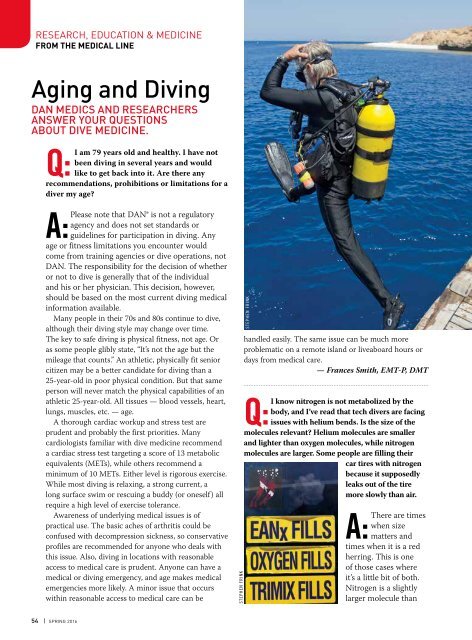AD 2016 Q2
As we pointed out in the spring 2013 edition of the Alert Diver, even being a dive buddy has potential legal implications. So, to bump this up a notch, what about the diver training organisations themselves? Where do they stand? How do they relate to South African law? Are they all considered the same under our legal system in spite of the differences in organisational structures and training programmes? How does this affect their respective instructors and trainee divers from a legal perspective? These are not exactly simple questions. It is certainly true that the respective training organisations differ in a number of ways. However, this does not imply that there are necessarily differential legal implications for each of them. In fact, under South African law, the legal principles are common in all matters. Therefore, if you suffer a loss and you (or your estate in the case of a fatality) wish to recover damages, the legal principles would be applied commonly; whether you are driving or diving. Although not a frequent occurrence, there have been quite a number of law suits associated with diving injuries and damages in South Africa. This is not surprising, as the occurrence of law suits is really a function of “numbers”. As training increases, so do the chances of injuries and, with it, the chances of legal recourse. So, it remains wise to insure yourself, your equipment or your business in a proper and effective way. But before getting back to the potential differences amongst the training agencies, let’s first explore the foundational legal principles on which any civil claim would be adjudicated: inherent risk, negligence and duty to take care.
As we pointed out in the spring 2013 edition of the Alert Diver, even being a dive buddy has potential legal implications. So, to bump this up a notch, what about the diver training organisations themselves? Where do they stand? How do they relate to South African law? Are they all considered the same under our legal system in spite of the differences in organisational structures and training programmes? How does this affect their respective instructors and trainee divers from a legal perspective? These are not exactly simple questions.
It is certainly true that the respective training organisations differ in a number of ways. However, this does not imply that there are necessarily differential legal implications for each of them. In fact, under South African law, the legal principles are common in all matters. Therefore, if you suffer a loss and you (or your estate in the case of a fatality) wish to recover damages, the legal principles would be applied commonly; whether you are driving or diving.
Although not a frequent occurrence, there have been quite a number of law suits associated with diving injuries and damages in South Africa. This is not surprising, as the occurrence of law suits is really a function of “numbers”. As training increases, so do the chances of injuries and, with it, the chances of legal recourse.
So, it remains wise to insure yourself, your equipment or your business in a proper and effective way. But before getting back to the potential differences amongst the training agencies, let’s first explore the foundational legal principles on which any civil claim would be adjudicated: inherent risk, negligence and duty to take care.
You also want an ePaper? Increase the reach of your titles
YUMPU automatically turns print PDFs into web optimized ePapers that Google loves.
RESEARCH, EDUCATION & MEDICINE<br />
FROM THE MEDICAL LINE<br />
Aging and Diving<br />
DAN MEDICS AND RESEARCHERS<br />
ANSWER YOUR QUESTIONS<br />
ABOUT DIVE MEDICINE.<br />
Q:I am 79 years old and healthy. I have not<br />
been diving in several years and would<br />
like to get back into it. Are there any<br />
recommendations, prohibitions or limitations for a<br />
diver my age?<br />
note that DAN® is not a regulatory<br />
agency and does not set standards or<br />
A:Please<br />
guidelines for participation in diving. Any<br />
age or fitness limitations you encounter would<br />
come from training agencies or dive operations, not<br />
DAN. The responsibility for the decision of whether<br />
or not to dive is generally that of the individual<br />
and his or her physician. This decision, however,<br />
should be based on the most current diving medical<br />
information available.<br />
Many people in their 70s and 80s continue to dive,<br />
although their diving style may change over time.<br />
The key to safe diving is physical fitness, not age. Or<br />
as some people glibly state, “It’s not the age but the<br />
mileage that counts.” An athletic, physically fit senior<br />
citizen may be a better candidate for diving than a<br />
25-year-old in poor physical condition. But that same<br />
person will never match the physical capabilities of an<br />
athletic 25-year-old. All tissues — blood vessels, heart,<br />
lungs, muscles, etc. — age.<br />
A thorough cardiac workup and stress test are<br />
prudent and probably the first priorities. Many<br />
cardiologists familiar with dive medicine recommend<br />
a cardiac stress test targeting a score of 13 metabolic<br />
equivalents (METs), while others recommend a<br />
minimum of 10 METs. Either level is rigorous exercise.<br />
While most diving is relaxing, a strong current, a<br />
long surface swim or rescuing a buddy (or oneself) all<br />
require a high level of exercise tolerance.<br />
Awareness of underlying medical issues is of<br />
practical use. The basic aches of arthritis could be<br />
confused with decompression sickness, so conservative<br />
profiles are recommended for anyone who deals with<br />
this issue. Also, diving in locations with reasonable<br />
access to medical care is prudent. Anyone can have a<br />
medical or diving emergency, and age makes medical<br />
emergencies more likely. A minor issue that occurs<br />
within reasonable access to medical care can be<br />
STEPHEN FRINK<br />
STEPHEN FRINK<br />
handled easily. The same issue can be much more<br />
problematic on a remote island or liveaboard hours or<br />
days from medical care.<br />
— Frances Smith, EMT-P, DMT<br />
Q:<br />
I know nitrogen is not metabolized by the<br />
body, and I’ve read that tech divers are facing<br />
issues with helium bends. Is the size of the<br />
molecules relevant? Helium molecules are smaller<br />
and lighter than oxygen molecules, while nitrogen<br />
molecules are larger. Some people are filling their<br />
car tires with nitrogen<br />
because it supposedly<br />
leaks out of the tire<br />
more slowly than air.<br />
A:<br />
There are times<br />
when size<br />
matters and<br />
times when it is a red<br />
herring. This is one<br />
of those cases where<br />
it’s a little bit of both.<br />
Nitrogen is a slightly<br />
larger molecule than<br />
54 | SPRING <strong>2016</strong>









